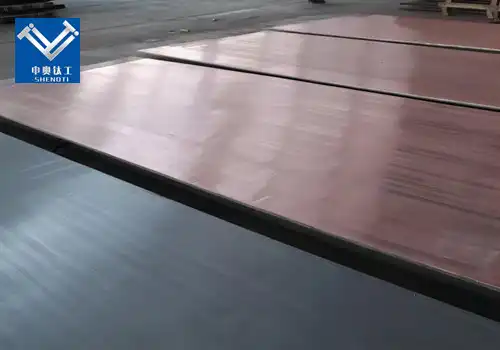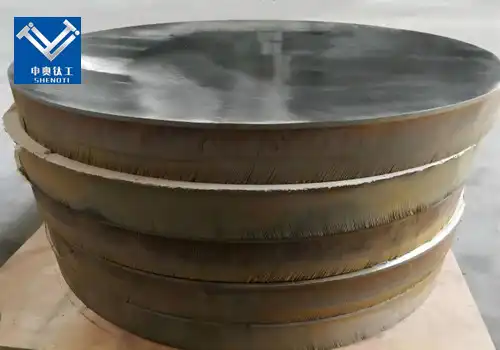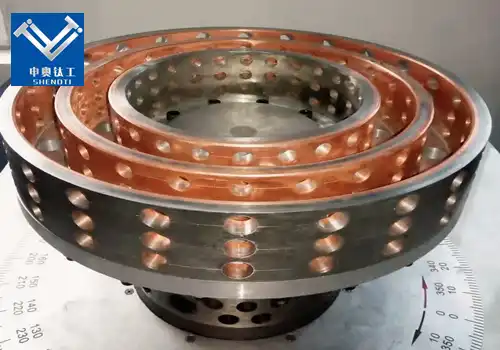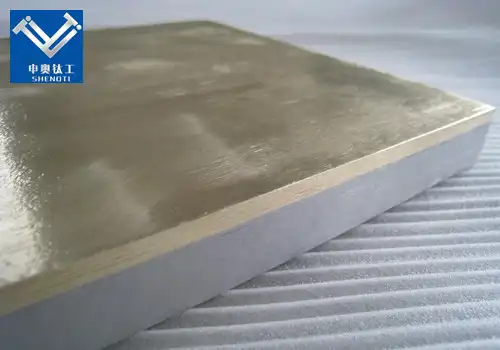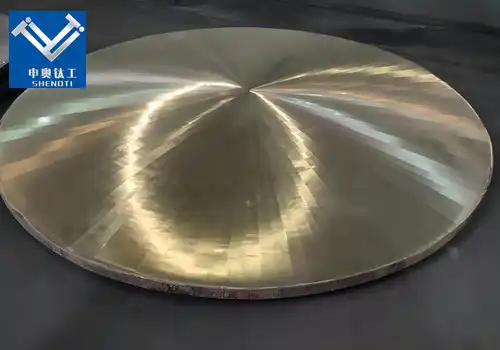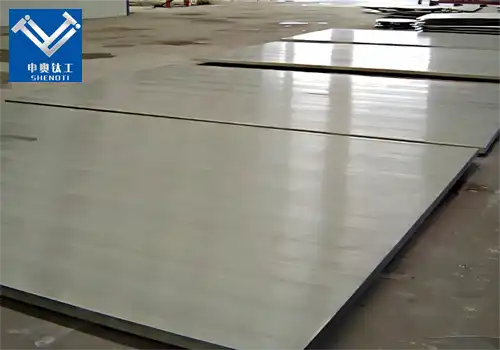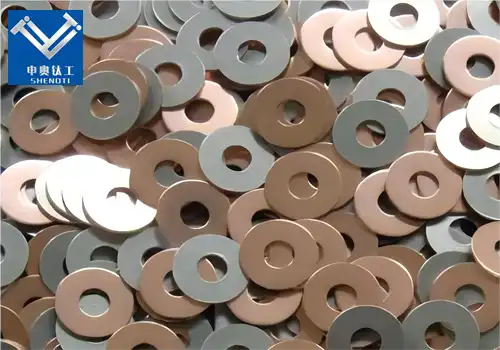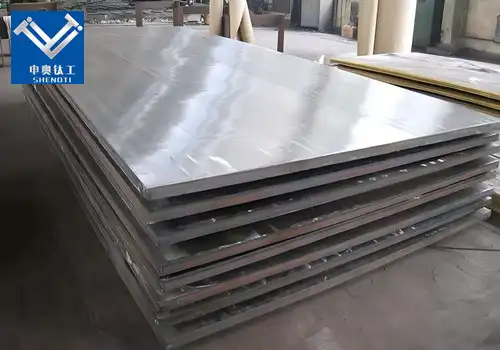
Why Choose Titanium Nickel Clad Plate Over Monometallic Alternatives?
2025-07-10 16:46:03
What is a Titanium Nickel Clad Plate?
A Titanium Nickel Clad Plate is a high-performance bimetallic material that combines the unique properties of titanium and nickel through explosive bonding or hot rolling processes. These plates feature a titanium layer (typically used for corrosion resistance) and a nickel base (used for structural strength and conductivity), offering a composite solution ideal for demanding industrial applications.
Why Choose Titanium Nickel Clad Plate Over Monometallic Alternatives?
Corrosion Resistance with Mechanical Integrity
The titanium layer in the Titanium Nickel Clad Plate provides exceptional resistance to corrosion, especially against acidic environments, seawater, and industrial chemicals. Nickel, on the other hand, contributes to the plate’s high thermal conductivity, tensile strength, and ductility, ensuring mechanical robustness under high-stress conditions.
Cost-Effective Engineering Material
Compared to using solid titanium or solid nickel plates, clad plates are significantly more cost-effective. By reducing the use of expensive titanium while retaining its surface properties, the Titanium Nickel Clad Plate lowers material costs without sacrificing performance.
Environmental and Industrial Benefits
Titanium nickel clad plates are environmentally friendly, durable, and recyclable. Their long service life reduces maintenance, downtime, and material waste, making them a sustainable choice for long-term projects.
Applications of Titanium Nickel Clad Plate in Key Industries
1: Chemical and Petrochemical Processing
2: Heat Exchangers and Reactors
The Titanium Nickel Clad Plate is extensively used in the manufacture of heat exchangers, condensers, and reactors. The titanium surface resists attack from strong acids such as hydrochloric and sulfuric acid, while the nickel layer provides strength under high pressure and temperature.
3: Storage Tanks and Pressure Vessels
In aggressive chemical environments, tanks and vessels made from titanium nickel clad plates maintain integrity far longer than conventional materials. Their dual-metal nature ensures safe containment of corrosive media without deformation or leakage.
4: Power Generation and Desalination
5: Condenser Tubes and Cooling Systems
Titanium nickel clad plates are ideal for thermal and nuclear power plants. The titanium side prevents scaling and fouling, especially when seawater is used for cooling. Nickel adds structural endurance, especially under dynamic loads and thermal cycling.
6: Seawater Desalination Equipment
Reverse osmosis systems and multi-stage flash desalination units benefit from the corrosion-proof characteristics of titanium and the structural support of nickel, allowing for uninterrupted, efficient operation in harsh saline environments.
7: Aerospace and Defense
8: Lightweight, High-Performance Structures
The aerospace industry requires materials with a high strength-to-weight ratio, and the Titanium Nickel Clad Plate delivers. Its resistance to fatigue and stress corrosion cracking ensures it performs reliably in aircraft structures, missile components, and engine parts.
9: Protective Armor and Shielding
Nickel-titanium composites are also used in ballistic and blast-proof applications. Their energy absorption capabilities, along with corrosion resistance, provide long-lasting protection in military vehicles and defense systems.
How Titanium Nickel Clad Plate is Manufactured
1: Explosion Bonding Technology
Explosion bonding is the most widely used technique to produce Titanium Nickel Clad Plate. This solid-state process uses controlled explosive energy to bond titanium and nickel under high pressure, ensuring a strong metallurgical interface without melting the base materials.
Advantages of Explosion Bonding:
No intermetallic formation
High bond strength
Large plate sizes achievable
Preserves base metal properties
2: Hot Rolling Method
Alternatively, hot rolling can be used, especially for smaller-scale or precision applications. The titanium and nickel are layered, heated, and rolled to bond them together. Though slower and more costly, this method offers fine thickness control and smooth surface finish.
Advantages of Using Titanium Nickel Clad Plate in Modern Engineering
H2: Dual-Metal Synergy
Titanium brings unmatched corrosion resistance, while nickel contributes superior mechanical properties. This combination reduces the total system weight and extends the operational lifespan of components.
1: Welding and Fabrication Friendly
Titanium nickel clad plates can be easily formed and welded using standard techniques. Their metallurgical bond withstands thermal stress during fabrication, allowing for complex shapes and assemblies.
2: Long-Term Durability
With proper installation and minimal maintenance, components made from titanium nickel clad plates can last decades—even in the most aggressive environments. This long life cycle translates to fewer replacements and lower lifecycle costs.
Technical Specifications of Titanium Nickel Clad Plate
|
Parameter |
Specification |
|
Cladding Material |
Commercially pure titanium (Grade 1 or 2) |
|
Base Material |
Nickel or nickel-based alloy (Nickel 200, etc.) |
|
Bonding Method |
Explosion bonding / hot rolling |
|
Thickness Ratio (Ti:Ni) |
1:10 to 1:3 (customizable) |
|
Plate Dimensions |
Width up to 3000mm, Length up to 8000mm |
|
Bond Strength |
≥ 130 MPa |
|
Corrosion Resistance |
Excellent against chlorides, acids, seawater |
Note: Custom sizes and specifications are available based on project requirements.
Choosing the Right Supplier for Titanium Nickel Clad Plate
1: What to Look for in a Manufacturer
When sourcing Titanium Nickel Clad Plates, it’s essential to choose a manufacturer with:
Proven explosion bonding technology
ISO-certified quality management
Strong R&D and technical support
Global supply chain capability
A reliable supplier ensures consistent quality, competitive pricing, and timely delivery for large-scale industrial projects.
Frequently Asked Questions
1: Is titanium nickel clad plate corrosion-resistant?
Yes, it offers excellent resistance to most corrosive media due to the titanium surface layer.
2: Can titanium nickel clad plate be welded?
Yes, it can be welded using appropriate techniques. The titanium and nickel layers require specific filler materials and welding protocols.
3: How is it different from titanium alloy plate?
Titanium nickel clad plate is a layered bimetal product, whereas titanium alloy plate is a homogeneous mixture. Clad plates offer cost savings and combined properties.
4: What is the typical lead time for custom orders?
Lead time varies from 3–6 weeks depending on quantity, thickness, and bonding process.
Performance with Titanium Nickel Clad Plate
The Titanium Nickel Clad Plate is a forward-looking material that meets the growing demands of modern industry. With its unique combination of corrosion resistance, mechanical strength, cost efficiency, and long-term reliability, it stands out as a preferred solution for critical applications.
Whether you're designing next-generation pressure vessels, heat exchangers, or structural parts for marine and aerospace use, choosing Titanium Nickel Clad Plate ensures your system is built for performance and longevity.
About Us
Baoji City ShenAo Metal Materials Co., Ltd. is a trusted manufacturer of bimetallic clad materials, including titanium nickel clad plate, titanium steel clad plate, copper aluminum clad plate, and more. With over 15 years of experience and ISO-certified facilities, we serve customers across the chemical, energy, and defense industries worldwide.
We specialize in:
Explosion bonded clad plates
Titanium-based electrodes and materials
Customized metal composites
Contact Us
Baoji City ShenAo Metal Materials Co., Ltd.
📍 Address: Baoji High-tech Zone, Shaanxi, China
📧 Email: zh@baojiti.com.cn
🌐 Website: shenaocladplate.com
📞 Phone: +86-18729731603
YOU MAY LIKE











